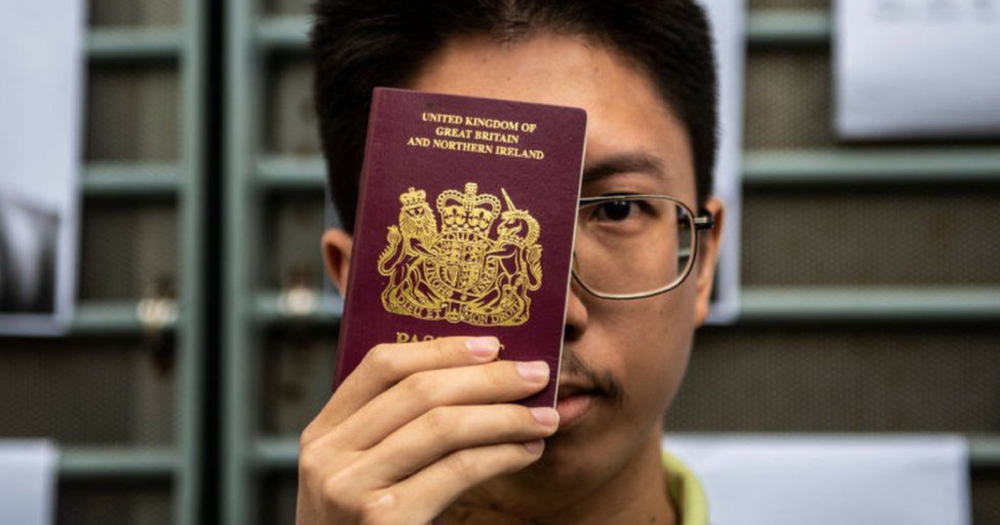There is no need for Hongkongers who want to move to the United Kingdom to prove their English proficiency upon arrival, or prove a minimum income, a document unveiling the new visa conditions revealed.
Have to speak English if they want to settle in the U.K.
However, while there is no English language requirement on entry, applicants and their dependents for the British National (Overseas) (BNO) visas must "demonstrate a commitment to learn English in the U.K".
They will also need "good knowledge of the English language" later on if they choose to apply for settled status after five years.
Expected to be "self-sufficient"
Also, while there is no need for a minimum income, BNO citizens are "expected to be self-sufficient and to integrate and contribute to the betterment of U.K. society".
In addition to having to be responsible for their own accommodation, they will also not have access to public funds such as unemployment and housing benefits, and will pay taxes and national insurance on their earnings in the country.
They can, however, have access to free healthcare should they pay the Immigration Health Surcharge -- a mandatory fee that applies to all foreign nationals staying in the U.K.
Applicants must also meet the U.K.'s "strict criminality checks and stay of good character".
Visa a chance for Hongkongers to obtain full British citizenship
Saying in the foreword of the policy statement that her offer to BNO citizens is "a very generous one", British Home Secretary Priti Patel said she welcomes "warmly" those who decide to take up the offer.
The U.K. is not "imposing skills tests or minimum income requirements, economic needs tests or caps on numbers", Patel said, adding that they have the "opportunity to acquire full British citizenship".
The move, she said, meant the U.K. was keeping its promise to Hong Kong residents "to uphold their freedoms".
The UK has a strong historic relationship with the people of Hong Kong & we are keeping our promise to them.
— Priti Patel MP (@pritipatel) July 22, 2020
BNO citizens now have the choice to come & live, work & study in the UK - enabling them to build a new life for them & their family.https://t.co/uP07j3NM9V
British Home Secretary: "Very generous" offer
The policy change was made to an existing BNO nationality status that originally allowed them to visit the U.K. visa-free for six months, the BBC reported.
The new offer now means BNO holders can apply for two periods of 30 months' leave or five years' leave to stay in the U.K., before applying for full British citizenship.
Applying for the five years' leave from the outset upon fulfilling certain requirements is "more cost effective overall", the statement said.
You can read the rest of the requirements in the policy statement here.
Move follows national security law on Hong Kong
The decision to introduce the new BNO visa follows the passing of a national security law on Hong Kong by the central government in Beijing.
The law came into effect at 11pm Hong Kong time on June 30, an hour before the 23rd anniversary of the city's handover.
The British government said the imposition of the law on Hong Kong is "a matter of deep regret".
It is "a clear breach of the 1984 Sino-British Joint Declaration" and undermines the "one country, two systems" framework, they said.
China has condemned the move, saying it reserves the right of "further reactions, the consequences of which shall be borne by the British side".
Chinese foreign ministry spokesperson Zhao Lijian previously said BNO passport holders are "Chinese nationals" and that the move "violates international law and basic norms of international relations".
The offer of citizenship to Hongkongers is one of the moves that the U.K. has made lately in its hostile turn towards China that perhaps signal a move away from its "new golden era" of relations with the country.
For instance, the U.K. has banned Chinese tech giant Huawei from its 5G network, and has also ratcheted up its criticism of the Chinese government's treatment of its Uyghur population in Xinjiang, accusing them of "gross and egregious" human rights abuses.
Top image via Getty Images
If you like what you read, follow us on Facebook, Instagram, Twitter and Telegram to get the latest updates.
